|
|
|
Sort Order |
|
|
|
Items / Page
|
|
|
|
|
|
|
| Srl | Item |
| 1 |
ID:
097539
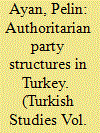

|
|
|
| 2 |
ID:
189519
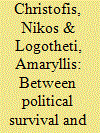

|
|
|
|
|
| Summary/Abstract |
Cyprus has featured prominently on Turkey’s foreign policy agenda in recent years. The ruling Justice and Development Party (AKP) has weaved this long-standing issue into a broader narrative of ‘geographical imagination’. Cyprus policy has thus reflected the AKP’s socio-political vision of a ‘Yeni Türkiye’ (New Turkey), first articulated nearly a decade ago, in which well-entrenched narratives about national identity and the Cyprus conflict are central. Against this backdrop, Cyprus has been leveraged in the twin interests of AKP survival (boosting incumbency through nationalist appeals) and Turkey’s regional power aspirations. The present article offers a timely survey of Turkey’s Cyprus policy over a 15-year period from 2002 (when the AKP rose to power) until the failure of the negotiation talks on Cyprus in Crans-Montana, Switzerland in July 2017. In so doing, the article charts the important continuities as well as the key markers of transition in Ankara’s policy towards Cyprus under the AKP.
|
|
|
|
|
|
|
|
|
|
|
|
|
|
|
|
| 3 |
ID:
131170
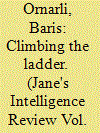

|
|
|
| 4 |
ID:
123424
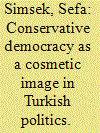

|
|
|
|
|
| Publication |
2013.
|
| Summary/Abstract |
Turkey's Justice and Development Party (AKP), known for its Islamic background, placed itself to the center-right in the political spectrum, and adopted conservative democracy as its new political identity. This study investigates first, what triggers the AKP's strong motivation for conservative democracy; second, what the theoretical foundations and universal validity of this concept are; third, whether and to what extent this concept explains the Turkish reality. It shows that conservative democracy is a cosmetic political image rather than reality within the Turkish context. It also serves as the most elusive and flexible strategy to legitimize the AKP both domestically and internationally.
|
|
|
|
|
|
|
|
|
|
|
|
|
|
|
|
| 5 |
ID:
114164
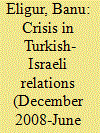

|
|
|
|
|
| Publication |
2012.
|
| Summary/Abstract |
Turkey and Israel had been strategic partners since the 1990s. Yet, there has been an unprecedented crisis between the two countries particularly since the winter of 2009. This article analyses the stalemate in bilateral relations, and argues that the Justice and Development Party's (Adalet ve Kalkinma Partisi, AKP) Islamist foreign policy toward the Middle East and the 2003 Iraqi war ended the sources of strategic partnership between Turkey and Israel.
|
|
|
|
|
|
|
|
|
|
|
|
|
|
|
|
| 6 |
ID:
127395
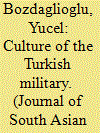

|
|
|
| 7 |
ID:
091995
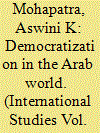

|
|
|
|
|
| Publication |
2008.
|
| Summary/Abstract |
The article argues that the Turkish experience with democracy may not affer a model for democratization of the Arab states in West Asia and North Africa.It begins with a brief account of institutional and political changes in Turkey since establishment of the modern Turkish Republic.It also explains how historical and structural conditions conducive to Turkey's progression to democracy are absent in much of the Arab world.
|
|
|
|
|
|
|
|
|
|
|
|
|
|
|
|
| 8 |
ID:
178541
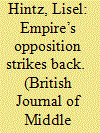

|
|
|
|
|
| Summary/Abstract |
In the early morning of September 6, 2019, two rap videos expressing frustrations with Turkey’s socio-political condition coincidentally dropped together and quickly went viral. Although one was more overtly political, both videos crystalized the rage, grief, and hopelessness many had been feeling under the 17-year rule of the Justice and Development Party (AKP). The dual release catalyzed a groundswell of online mobilization at a particularly tumultuous moment – one at which mass protest in the form of organized street demonstrations was effectively off the table. As this article argues, however, pushback against the AKP was alive and well in alternative spaces. From rap collaborations challenging corruption and rising rates of femicide to social media users repurposing familiar memes of TV shows with witty political critique, pop culture-themed acts of resistance signalled to others in Turkey’s fractious opposition that they were not alone. This articles addresses an interdisciplinary body of literature that examines the AKP’s deployment of entertainment media to extend its soft power abroad and cultivate a conservative society at home, but turns it around to explore how various opposition actors strike back by taking pop culture into their own hands as a tool of expression, mobilization, and subversion.
|
|
|
|
|
|
|
|
|
|
|
|
|
|
|
|
| 9 |
ID:
120750


|
|
|
|
|
| Publication |
2013.
|
| Summary/Abstract |
As political trust literature has focused on its political and economical determinants, the linkage between ethnicity and trust in domestic and international institutions has been largely overlooked with a few notable exceptions. This study aims to underline this linkage and offer several hypotheses to test them in Turkish context. Using the European Social Survey conducted in 2008, this study finds that, though Kurds have low levels of trust in domestic institutions, their distrust is not uniform across all institutions. Second, it finds that Kurds are pro-international institutions; that is, compared to Turks, they hold higher trust in international institutions. Finally, it finds that, contrary to the studies on the winner/loser debate in long-standing democracies, winners in general and Kurdish winners, those who voted for the Justice and Development Party, the winning party in the 2007 election-are not distinguishable in their level of trust in political institutions from the rest of society.
|
|
|
|
|
|
|
|
|
|
|
|
|
|
|
|
| 10 |
ID:
120760
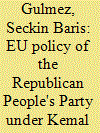

|
|
|
|
|
| Publication |
2013.
|
| Summary/Abstract |
This article scrutinizes the determinants of the European Union (EU) policy of the Republican People's Party (CHP), the main opposition party in Turkey under the leadership of Kiliçdaroglu. Critically discussing the role of party ideology concerning attitudes toward EU accession, the article examines whether the CHP's ideology changed after Kiliçdaroglu and if so, how this ideological shift affected the party's euroskeptic stance. The article overall argues that the leadership change enabled the party to withdraw its nationalistic stance and embrace a social democratic rhetoric. However, the article contends that such transformation had little effect on its euroskepticism due to the persisting endogenous (the Justice and Development Party's authoritarianism) and exogenous factors (the EU's additional conditionality) that constrain the new CHP's EU-enthusiasm.
|
|
|
|
|
|
|
|
|
|
|
|
|
|
|
|
| 11 |
ID:
173145
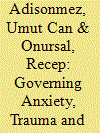

|
|
|
|
|
| Summary/Abstract |
Concern about the ontological security of the state has been at the center of Turkish politics since the beginning of the republican regime in 1923, shaping both the domestic and the foreign policy of Turkey. Taking the July 15 coup attempt in 2016 as a case, this article critically analyzes the political discourse on ontological (in)security in Turkey. The discussion begins by locating the discourse on the survival of the state [beka meselesi in Turkish] in a historical and sociopolitical context. Building on this discussion, the article investigates how unprecedented political instability caused by the failed coup attempt created a political space for the ruling Justice and Development Party to re-articulate the state’s survival discourse and related security practices. The article argues that governing elites followed a double strategy. On one hand, they aimed at simplifying the sociopolitical space with a ‘one nation, one state, one homeland, and one flag’ discourse; on the other hand, they actively prevented public contestation by keeping the political dimension of the coup at bay. To advance this argument, the article develops a discursive-theoretical framework by cross-fertilizing Ontological Security Theory with Post-foundational Discourse Theory.
|
|
|
|
|
|
|
|
|
|
|
|
|
|
|
|
| 12 |
ID:
116407
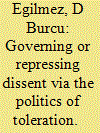

|
|
|
|
|
| Publication |
2012.
|
| Summary/Abstract |
This paper attempts to critically scrutinize the recent policies of Turkey's ruling Justice and Development Party (AKP) in relation to the Turkish working class by means of the liberal concept of toleration. In order to realize this objective, it investigates the links between the theoretical framework of toleration, the AKP policies toward the working class (conceptualized in terms of toleration) and the history of dissent articulated by Turkish workers under the AKP. The five most recent May Day demonstrations (2007-11) constitute the focus of this study as historical moments when this tripartite relationship became most visible. As such, this study discusses the relationship between class difference, toleration and the substitution of the binary value of justice-philanthropy for that of equality.
|
|
|
|
|
|
|
|
|
|
|
|
|
|
|
|
| 13 |
ID:
174664
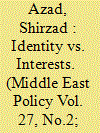

|
|
|
|
|
| Summary/Abstract |
Since the ascendancy of the Justice and Development Party (AKP) in 2002, Turkey has critically reappraised its foreign‐policy priorities. Led by President Recep Tayyip Erdoğan, the Turkish political establishment has reset its conventional pattern of foreign‐policy behavior by distancing the country from the West in favor of better connections to other regions. Turkey has not abandoned its long‐cherished aspiration of European Union (EU) membership, but its top leadership has demonstrated that the Turks are no longer willing to pay any demeaning cost in order to achieve that erstwhile goal. Moreover, Turkish leaders have sometimes even gone out of their way to criticize certain Western politico‐economic as well as cultural policies, no matter that their country is still an active member of the North Atlantic Treaty Organization (NATO).
|
|
|
|
|
|
|
|
|
|
|
|
|
|
|
|
| 14 |
ID:
118255
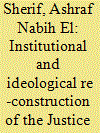

|
|
|
| 15 |
ID:
118886
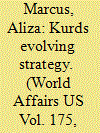

|
|
|
| 16 |
ID:
116399
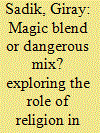

|
|
|
|
|
| Publication |
2012.
|
| Summary/Abstract |
In the aftermath of 9/11, Islam has been put at the heart of heated debates about the role of religion in foreign policy. In the following year of 2002, the election of the Justice and Development Party (AKP) to government has brought new questions to the table about how Turkey can respond to the changes in its transforming environment, and whether Turkey would transform its foreign policy. Considering the moderate Islamist background of the AKP government and its pro-active foreign policy toward Muslim countries, there is a need to explore the processes of how Islam has become an appealing ground for constructing an identity-based Turkish foreign policy. To project if (or how) this transformation is likely to last beyond the AKP, one needs to delineate how Islam interacts with geopolitics when crafting Turkish foreign policy. The article explores this interaction within the context of transforming Turkish foreign policy by benefitting from theoretical insights of constructivism and realism.
|
|
|
|
|
|
|
|
|
|
|
|
|
|
|
|
| 17 |
ID:
116400
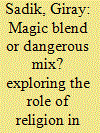

|
|
|
|
|
| Publication |
2012.
|
| Summary/Abstract |
In the aftermath of 9/11, Islam has been put at the heart of heated debates about the role of religion in foreign policy. In the following year of 2002, the election of the Justice and Development Party (AKP) to government has brought new questions to the table about how Turkey can respond to the changes in its transforming environment, and whether Turkey would transform its foreign policy. Considering the moderate Islamist background of the AKP government and its pro-active foreign policy toward Muslim countries, there is a need to explore the processes of how Islam has become an appealing ground for constructing an identity-based Turkish foreign policy. To project if (or how) this transformation is likely to last beyond the AKP, one needs to delineate how Islam interacts with geopolitics when crafting Turkish foreign policy. The article explores this interaction within the context of transforming Turkish foreign policy by benefitting from theoretical insights of constructivism and realism.
|
|
|
|
|
|
|
|
|
|
|
|
|
|
|
|
| 18 |
ID:
172504
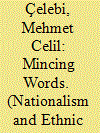

|
|
|
|
|
| Summary/Abstract |
In 2009–2015, the Justice and Development Party (AKP) put forward several initiatives to end insurgency in Kurdish majority areas. However, successive “openings” failed to make progress. The electoral and international goals of the AKP gradually became incongruent with the peace process, and the AKP espoused heavy-handed tactics in July 2015. The ups and downs of the process in 2009–2015 show that it was already fragile. Some causes of this fragility were external to the AKP, such as the opposition parties’ eagerness to use the process to poach nationalist voters and the PKK’s violence. However, I argue that the contradictory nature of the AKP’s narrative was also a crucial factor. The party’s earlier narrative required the strict separation of two layers: security policies to fight terrorists and democratization policies to address the legitimate grievances of citizens. However, the intersubjective strategies that it experimented later required a gray area between these two fields. The AKP, instead of changing strategies, has constructed a three-layered, contradictory narrative.
|
|
|
|
|
|
|
|
|
|
|
|
|
|
|
|
| 19 |
ID:
121884
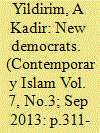

|
|
|
|
|
| Publication |
2013.
|
| Summary/Abstract |
I analyze the positive and leading role religious actors play in democratic consolidation in Turkey in recent years. I argue that major social changes might lead to such outcomes. Empirically, I show that two major religious actors in Turkey-the Gulen Movement and the Justice and Development Party (AKP)-have adopted favorable positions on EU membership, ethnic and religious minorities, and pluralism in the last decade. This remarkable transformation owes its existence to the economic liberalization reforms initiated in the early 1980s, and the "post-modern coup" of 1997. This transformation reflects the need of both religious actors for greater democracy from a purely self-interested perspective. The Gulen Movement prefers an open and democratic system to sustain its organizational existence. The AKP responds to the preferences of its own constituency. These unique conditions have made two religious actors catalysts of democratization along with some liberal democrats in Turkey. Empirically, I rely on European Union's Turkey progress reports and a recent analysis of religious Turkish media to support the argument.
|
|
|
|
|
|
|
|
|
|
|
|
|
|
|
|
| 20 |
ID:
106610
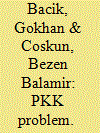

|
|
|
|
|
| Publication |
2011.
|
| Summary/Abstract |
This article discusses why Turkey has failed to propose an effective political solution of the Kurdish problem. It is argued that Turkey's failure to propose an effective political agenda is the main explanation of why Partiya Karkeran Kurdistan (PKK) insurgency has been rampant for so long. Turkey's commitment to militaristic methods worsened the Kurdish problem by creating deeper social problems. Furthermore, it is argued that the explanations tendered also point out the important factors that may affect the fate of any political agenda on the Kurdish problem, including that of the recent Kurdish initiative of the Justice and Development Party (AKP) government.
|
|
|
|
|
|
|
|
|
|
|
|
|
|
|
|
|
|
|
|
|